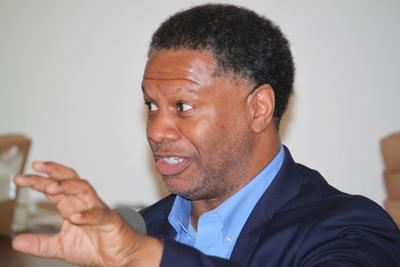DANVILLE, Va. — Through a budding partnership between Piedmont Access to Health Services (PATHS) and Virginia Commonwealth University (VCU), Massey Cancer Center Director Dr. Robert Winn is on a mission to "make Danville healthier" by addressing racial disparities systemic in screening of preventable cancers.
During a seminar Thursday afternoon in the Danville Museum of Fine Arts and History auditorium, public health and community leaders from Danville, Pittsylvania County and Richmond engaged in a meeting of the minds as they discussed Project COALESCE, a two-year collaborative effort funded by Pfizer and the American Cancer Society to address race-related barriers to colorectal and cervical cancer screening in Danville, Martinsville, Brunswick and Richmond.
Community assets involved in the conversation included PATHS, HAVEN of the Dan River Region, Danville Redevelopment and Housing Authority, Hoop Don't Shoot, Vance Street Missionary Baptist Church, Danville City Council, IALR and the Pittsylvania-Danville Health District.
PATHS serves 23,000 patients, about 40 percent of the total number of patients served over five dyads in Danville, Martinsville, Brunswick and Richmond. Most of those served are female, most are uninsured or underinsured, and more than 70 percent are Black.
"It puts this flat number that otherwise is meaningless into perspective," said the Massey Center's Dr. Kathy Tossas of her immersion with PATHS patients in Danville. "That is very powerful."
Currently, the average colon cancer screening rate in Danville is 41 percent, and the average cervical cancer screening rate is 47 percent. This partnership set the "modest goal" to increase those numbers by 5-10 percent each, with the ultimate objective of hitting 74 percent by 2030.
The City of Danville ranks 127th of 133 Virginia localities in this regard. Twenty-one percent of Danville residents are smokers, 30 percent are obese and the median income is half of Virginia's median income. Additionally, the lifespan in Danville is 72 years, compared to Virginia's 84. Teen pregnancy and sexual education are problematic in Danville-Pittsylvania as well.
"It has to do with social and economic factors," Tossas said. "Racism is a collective responsibility, and we address it as such. Racism is a public health issue."
According to Dr. Winn, one issue that disproportionately affects minority racial groups is a fear of participating in clinical trials, which impedes the overall health profile of those demographics.
"Let's not go backwards, let's go forward in time," Winn said. "The truth of the matter is, those folks in clinical trials had better outcomes than anyone getting the standard of care. That's just a fact. Most of our rural communities, most of the African-American and Latino community, have no idea that if you are on a clinical trial, your outcome, even if you are not getting the 'experimental drug,' is better because of the infrastructure. But how many people know that?"
Winn hopes to offer clinical trials and extra specialists when and where they are needed in Danville-Pittsylvania County.
"The question is, what additional resources are needed to get that extra 2 percent, 5 percent, 10 percent?" Winn said. "And that's what we're in the business of finding out."
Winn said the Massey Cancer Center in Richmond is an underutilized resource both locally and across the commonwealth.
"The whole goal was for the federal government and the NIH to partner with certain academic institutions and deputize them so that they would have the cutting-edge studies, the cutting-edge research and the cutting-edge treatments. That's only 71 of the 5,000 cancer centers in the country and you have two in your backyard—UVA and VCU," he said. "What do I want to do here? The direct answer is to open up more resources so that you don't always have to travel to Richmond to get them, but when you do, we got you. But to put more resources in places like Danville, that's my goal. Not only is that my goal, that's my mission."
Winn called out the paradoxical nature of hospitals and cancer centers at public universities.
"At a public institution, it's interesting. A public institution is supposed to serve the public, but frequently it sounds like it does not," Winn said. "I want to start a new partnership with you where we don't do that."
Those living in Danville have Duke, UNC, UVA, VCU and Virginia Tech within reasonable driving distance, but residents especially in lower income brackets lack awareness of the specialists that could be available just beyond their own neighborhoods.
"One team, one fight. I believe that I'm in the fight with you, and the reality is I will roll up my sleeves to get down with you in the weeds," Winn said. "We can't do things differently if we don't do things differently, and part of that is having these conversations."
According to the National Academy of Medicine, colorectal and cervical cancers are the two most survivable cancers. Winn said there is no reason why anyone in Danville should have to fear dying from either one.
"Come on y'all, let's quit playing. It's unequivocal, it is not deniable, that colorectal screening directly saves lives," he said. "All of those states that enacted Medicare expansion and that also put money into colorectal screening—all of them have seen a decrease in colorectal deaths. Every single last one. The states that have not have either stayed flat or had an increase. So let's stop playing. Colorectal cancer and cervical cancer are ridiculously screenable. There shouldn't be any more deaths in Danville. It makes no sense that in 2021, we have people here dying form those diseases."
PATHS CEO Marsha Mendenhall said there has been a significant internal push in Medicare applications, COVID-19 vaccinations and other vital health resources, but what's available locally is simply insufficient without a partnership like Project COALESCE. For example, even with tireless efforts made to push the COVID-19 vaccines, local vaccination rates lag far behind the state average at about 30 percent.
"That's really low for vaccination rates, so what that tells me is that we got to consider who we're dealing with and why," Mendenhall said. "It has got to come from a trusted community member to push these results."
PATHS personnel push for cancer screenings and much more in their medical offices, and the rates have come up significantly. But they need another angle to permeate the shrouded majority still unattended in the Dan River Region.
"We're glad to participate, because we know this needs to be done in our community. We welcome any help," Mendenhall said. "Our community health workers are going to be vital to our success with this program. We all want our community to rise out of that 127th spot. That's really what it's all about."











(0) comments
Welcome to the discussion.
Log In
Keep it Clean. Please avoid obscene, vulgar, lewd, racist or sexually-oriented language.
PLEASE TURN OFF YOUR CAPS LOCK.
Don't Threaten. Threats of harming another person will not be tolerated.
Be Truthful. Don't knowingly lie about anyone or anything.
Be Nice. No racism, sexism or any sort of -ism that is degrading to another person.
Be Proactive. Use the 'Report' link on each comment to let us know of abusive posts.
Share with Us. We'd love to hear eyewitness accounts, the history behind an article.